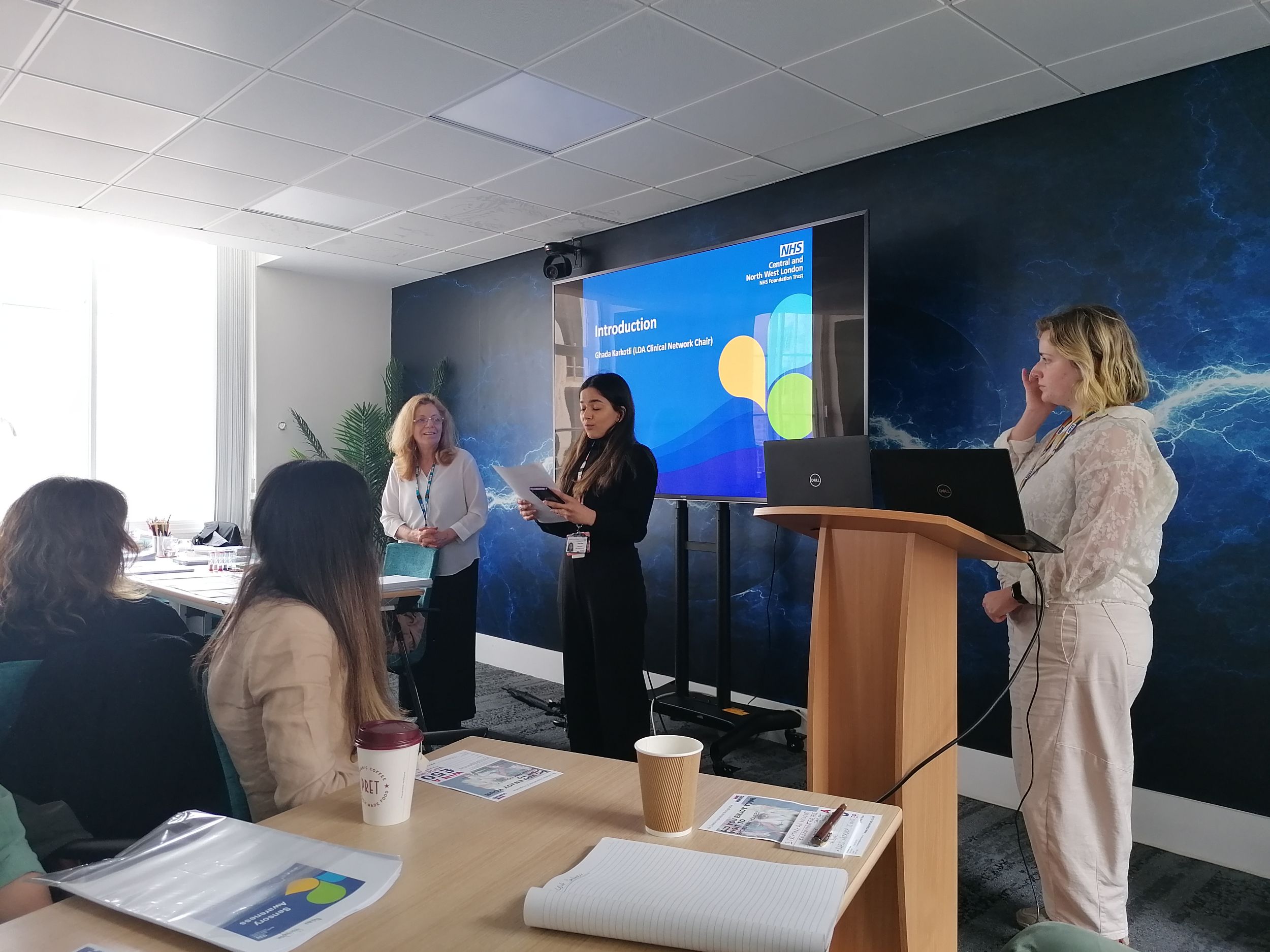Posted on: 24 May 2024
 From across CNWL, over 100 colleagues gathered at Broadway House for a series of talks and workshops on learning disabilities and neurodiversity. The conference attracted a wide range of clinical staff from multiple boroughs, including psychiatrists, psychologists, nurses, and occupational therapists. Peer support workers, experts by experience, clinicians and representatives from partner organisations also attended.
From across CNWL, over 100 colleagues gathered at Broadway House for a series of talks and workshops on learning disabilities and neurodiversity. The conference attracted a wide range of clinical staff from multiple boroughs, including psychiatrists, psychologists, nurses, and occupational therapists. Peer support workers, experts by experience, clinicians and representatives from partner organisations also attended.
The day began with a virtual message from CNWL’s CEO, Claire Murdoch, who emphasized the significance of the day’s agenda and expressed her gratitude to everyone in attendance. Claire said, “I would love for us to be a beacon in this area for recruiting and retaining the best of staff. And above all, I’d love for us to be known nationally and internationally for our co-production with partners and experts by experience.”
Conference organizers Ghada Karkotli, LDA Clinical Network Chair & LD Nurse Consultant, and Ceridwen Ball, Project Manager for Strategy and Transformation, then introduced the day’s aims: “to build clinical confidence by sharing ideas and resources between us. CNWL is a large organization, and we want to ensure each team is working together and not in isolation.” An icebreaker hosted by Santino Vassell, Expert by Experience and Social Care Recovery Trainer, followed, inviting staff to discuss the meanings of learning disability and autism in small groups.
The overall theme of the event was accessibility and fostering an inclusive environment across our organizations. Attendees were given accessibility resources, such as printed versions of the PowerPoint slides, writing materials, colouring books as well as the option to visit a sensory room created in the building. These adaptations were a means of demonstrating the actionable inclusivity protocols that could be integrated throughout the trust.
Several speakers joined us as the day continued. Justine Maher and Jeremy Woods discussed The Bridge Service (Sexual Health Services for People with Learning Disabilities) and its adaptations for neurodiverse people, including creating capacity assessments to gauge the ability to consent. Stephen Haynes, Learning Disability and Neurodiversity Lead Clinician, provided an insightful discussion on learning disabilities and neurodivergence in the prison system, highlighting the lack of accurate figures and the necessity for better data to create a more inclusive environment. His presentation sparked lively discussions among participants, with one noting, “We need to subvert the stigmatizing assumption that antisocial behaviours are symptoms of neurodiversity. We, as staff, play a key role in educating ourselves and others.”
continued. Justine Maher and Jeremy Woods discussed The Bridge Service (Sexual Health Services for People with Learning Disabilities) and its adaptations for neurodiverse people, including creating capacity assessments to gauge the ability to consent. Stephen Haynes, Learning Disability and Neurodiversity Lead Clinician, provided an insightful discussion on learning disabilities and neurodivergence in the prison system, highlighting the lack of accurate figures and the necessity for better data to create a more inclusive environment. His presentation sparked lively discussions among participants, with one noting, “We need to subvert the stigmatizing assumption that antisocial behaviours are symptoms of neurodiversity. We, as staff, play a key role in educating ourselves and others.”
Following this, a discussion on sensory awareness and inclusive communication by Liliana Mandal, Borough Lead Occupational Therapist for Harrow, Roshni Ardeshna, Lead Occupational Therapist for Harrow Community Mental Health Team, and Erin Kiernan, Professional Lead for Speech and Language Therapy, emphasized the importance of adapting communication skills to account for non-verbal forms of communication. Participants were then given a task to create an image from verbal instruction alone, showcasing the misunderstanding that may arise from not accounting for other forms of communication. As Oscar Patton Lyons, Advanced Lived Experience Practitioner, said, “Disability is a social construct; it is about the environment and creating an environment that adapts to all.” This statement perfectly encapsulates the commitment to ‘Ask, Listen, Do’ that was pledged at this conference.
Ask, Listen, Do is a framework aimed at improving experiences and outcomes for children and adults who are autistic or have a learning disability, along with their families and carers. It emerged from the poor experiences people reported when giving feedback, raising concerns, and making complaints. A survey involving nearly 1,300 people revealed that nine out of ten had wanted to raise a concern or complaint at some time, but two out of three did not always know how to do this, and seven out of ten felt their complaints did not lead to changes in how organizations support people.
People with a learning disability or who are autistic often face more health inequalities than other groups, which are unfair and sometimes life-shortening differences that could be avoided. History shows that these individuals can be at increased risk of harm through institutional abuse or neglect, making it crucial for organizations to encourage the reporting of and response to concerns.
Ask, Listen, Do involves ensuring that people, their families, and staff are truly listened to and that their concerns are acted on. The event concluded with a collaborative task, where participants worked together to create an action plan to address the issues around accessibility raised by patients.
We are committed to improving the quality of care for individuals with learning disabilities and neurodivergence. The engaging discussions, insightful presentations, and shared dedication highlighted our unified goal. By embracing the principles of Ask, Listen, Do, we reaffirm our pledge to listen, learn, and act, ensuring that everyone receives the high-quality, person-centred care they deserve.













